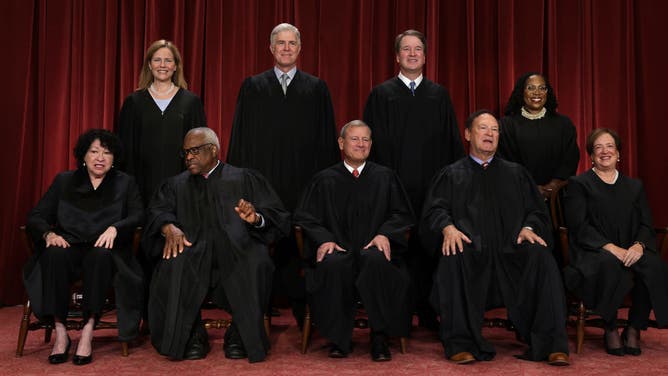Supreme Court Investigation Fails to Find Who Leaked Abortion Decision
The Supreme Court announced today that their investigative efforts have failed to determine who leaked the draft opinion in the Dobbs case that overturned Roe v. Wade last year.
The opinion leak was one of the biggest stories of 2022, and shaped the political landscape for several months.
At the time, it seemed abundantly clear that the leaker intended to intimidate the justices into changing their ruling.
Those efforts were unsuccessful, although it did result in months of protests. Once the official decision was announced, activists moved to protesting at the homes of Supreme Court justices.
READ: ABORTION PROTESTORS MOB HOME OF SUPREME COURT JUSTICE
The Supreme Court generally has been extremely secretive on draft opinions, meaning this leak was essentially unprecedented. As such, determining who was responsible became a vital part of maintaining integrity in their process.
Chief Justice John Roberts last spring said they would investigate and find the leaker who breached that trust. But eight months later, they're no closer to finding an answer.
"Despite these efforts, investigators have been unable to determine at this time, using a preponderance of the evidence standard, the identity of the person(s) who disclosed the draft majority opinion in Dobbs v. Jackson Women’s Health Org. or how the draft opinion was provided to Politico. Investigators continue to review and process some electronic data that has been collected and a few other inquiries remain pending. To the extent that additional investigation yields new evidence or leads, the investigators will pursue them," the Marshal's report read.

WASHINGTON, DC - OCTOBER 07: United States Supreme Court (front row L-R) Associate Justice Sonia Sotomayor, Associate Justice Clarence Thomas, Chief Justice of the United States John Roberts, Associate Justice Samuel Alito, and Associate Justice Elena Kagan, (back row L-R) Associate Justice Amy Coney Barrett, Associate Justice Neil Gorsuch, Associate Justice Brett Kavanaugh and Associate Justice Ketanji Brown Jackson. (Photo by Alex Wong/Getty Images)
How Could Supreme Court Investigation Fail?
It's extremely odd that the Supreme Court investigation hasn't turned up more concrete leads or suspects.
The investigation seemingly should have had a relatively narrow scope, given the limited amount of people with access.
In fact, Fox News reported in 2022 that the "initial focus was on some three dozen law clerks who work directly with the justices."
The Court's statement explained that 82 employees had access to the opinion. Although a number were selected for follow-up interviews, they were "unable to identify a person responsible by a preponderance of the evidence."
How could that be? Preponderance of the evidence isn't a particularly high legal standard. Yet even that wasn't enough to uncover the leaker.
If it was easy enough for the culprit to leak the opinion without leaving a paper trail, the Supreme Court could definitely use an IT security upgrade.
Given the failure of the investigation, despite its length and scope, it seems unlikely we'll ever find out who was responsible.
Which also means a dangerous precedent has been set. If someone intimiately involved with the Court doesn't like their decision, they can try to influence opinions through public pressure without being punished.